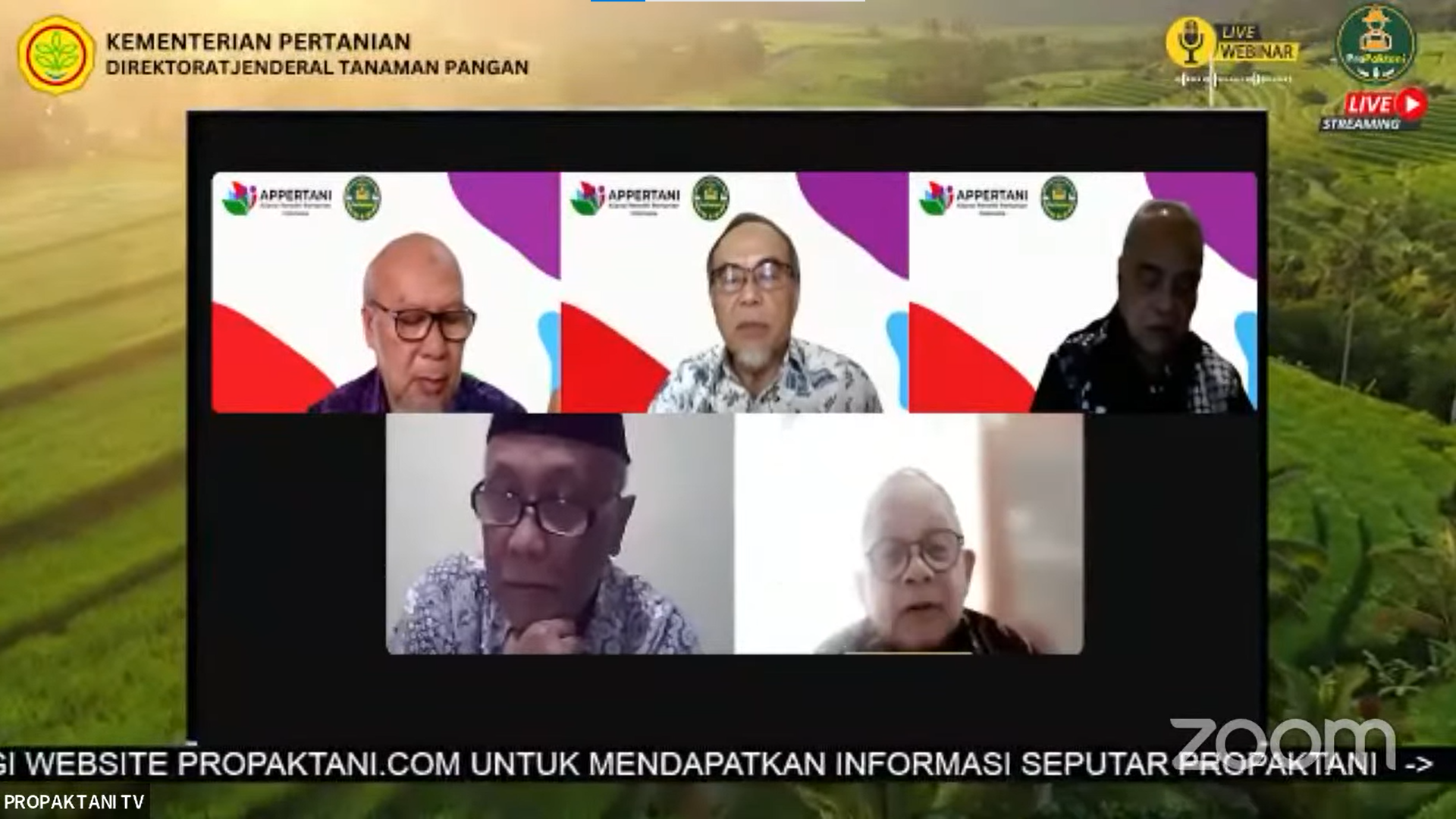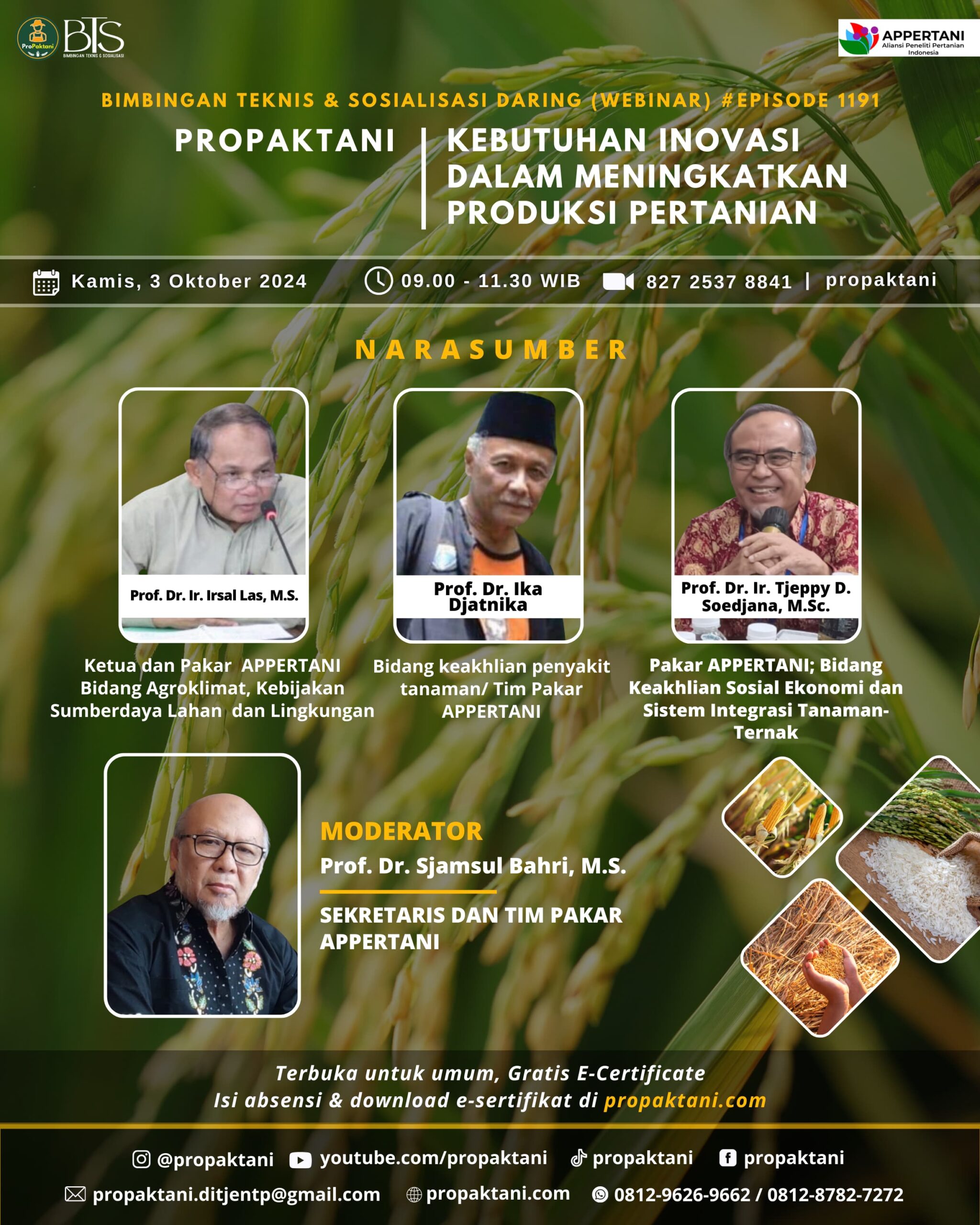Online Socialization and Technical Guidance (WEBINAR) #EPISODE 1191 PROPAKTANI

The Need for Innovation in Increasing Agricultural Production
Economic resilience needs to be strengthened as one of the seven agendas of the RPJMN-2020-2024. Innovation and investment as the main capital for economic resilience need to be increased in use to encourage sustainable economic growth, to provide welfare to the wider community in a fair and equitable manner. The contribution of economic growth in the agricultural sector is expected to continue to increase compared to the previous five-year period. Technology, innovation, networks and solid cooperation are expected to spur economic development in the agricultural sector to grow higher, inclusive, and competitive through the management of economic resources in meeting the needs of food and other agricultural products as well as accelerating the increase in the added value of the products produced. Propaktani episode 1191 organized by APPERTANI discussed the topic: The Need for Innovation in Increasing Agricultural Production, to spur economic development in the agricultural sector. As the moderator of this webinar episode is Prof. Dr. Sjamsul Bahri, M.S., Secretary and APPERTANI Expert Team.

Prof. Dr. Deciyanto Soetopo, M.S., APPERTANI Expert Team for Food Plant Pests and Diseases who is also a BRIN researcher, delivered the topic: “Selection of Superior Agricultural Innovations: The Need for Innovation in Increasing Agricultural Production”. The acceleration of innovation-based economic development is one of the stages in achieving Indonesia’s Vision 2045. The optimal application of superior innovations will encourage the acceleration of the success of national development in the agricultural sector. Universities and IAARD are institutions that produce superior agricultural technology innovations. The Ministry of Agriculture in 2022 carried out a selection of superior technological innovations in the agricultural sector to be examined for readiness to support agricultural development. The selection of superior agricultural innovations is carried out with three criteria, namely readiness to be developed, economic benefits and sustainability. The assessment was carried out using weighting and scores. Based on the total value of technological innovation, it is recommended to be very feasible, feasible and not yet feasible to be developed. Of the 94 proposals, 88 that have been assessed consist of technological innovations in rice, corn, soybeans, cassava, other food crops, plantations, horticulture and livestock have obtained 16 technological innovations that are very feasible and feasible 23 to be developed.
Prof. Dr. Ika Djatnika, APPERTANI Expert Team for Plant Pest and Disease Expertise delivered material with the topic: “Superior Innovations to Increase Horticultural Plant Production” including problems, challenges to utilize local natural resources in terms of saving raw materials by utilizing natural materials such as biofertilizers and phytohormones. The main production inputs of fertilizers and pesticides are still imported, so the procurement is disrupted due to wars between countries, plus the selling price of products fluctuates which does not always benefit producers. Other problems are water difficulties such as a negative impact of climate change, land conversion and the younger generation who are less interested in agriculture. Saving raw materials is recommended by combining synthetic chemical fertilizers with livestock manure, the use of pesticides based on the results of observations of the control threshold, and multifunctional biological fertilizers. The use of natural materials such as lime-sulfur, vegetable pesticides, liquid smoke, animal manure, worm manure and fermented plant residues. Inspiration for increasing horticultural production needs to be done by triggering young farmers to develop, increasing the activities of farmer groups and testing technology according to scientific methods not only with “testimonials”.
Prof. Dr. Ir. Tjeppy D. Soedjana, M.Sc. APPERTANI Expert Team in the Field of Socio-Economic Expertise and Crop-Livestock Integration System delivered material with the topic: “Efficiency of Land and Feed Resources through Plant-Livestock Integration Innovation”. He explained the resources of oil palm plantations, beef cattle resources and the potential of palm-cattle integration to meet the needs of domestic beef consumption. The total area of oil palm plantations reaches 16 million ha, of which 58% is managed by private companies and state-owned enterprises, and the remaining 42% is smallholder plantations. Biomass from oil palm plantations 1/3 of the fronds can be used as animal feed. Oil palm plantations exceeding 1 million ha are spread across the provinces of Riau, West Kalimantan, Central Kalimantan, North Sumatra and East Kalimantan. Increasing the population of middle-to-upper income households has pushed the demand for beef to continue to increase amid the development of tourism in eastern Indonesia which has reduced the area of pasture. Intensive (least-cost) beef cattle farming requires a large exercise area as well as oil palm plantations, which provide both biomass/feed and land. The cow-oil palm integration system provides mutual benefits creating added value from the Cow-Palm Oil (KS) Integration, increasing the Total Benefit = (K) + (S) + (KS) compared to without integration = (K) and (S). The integration of cows and palm oil can supply food, feed, and energy in a sustainable manner.

